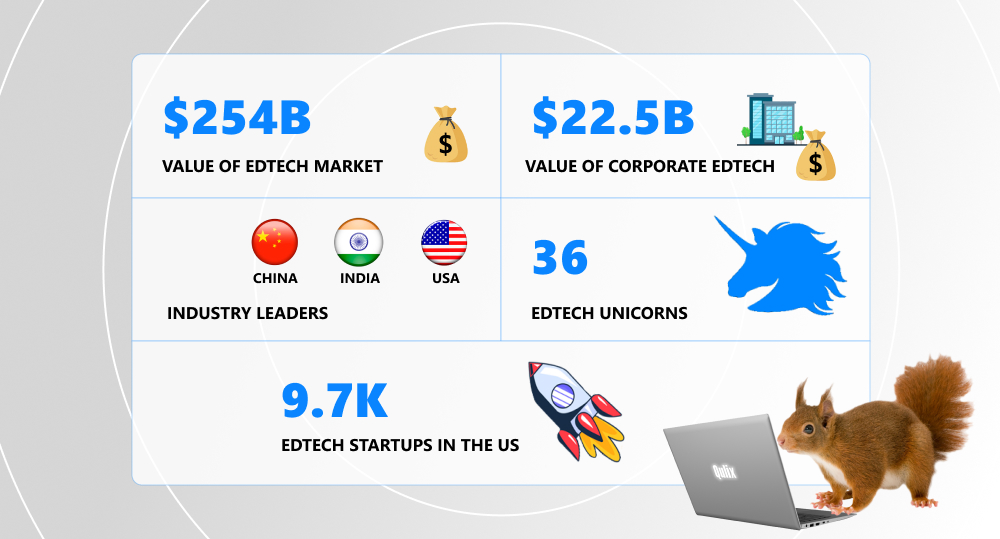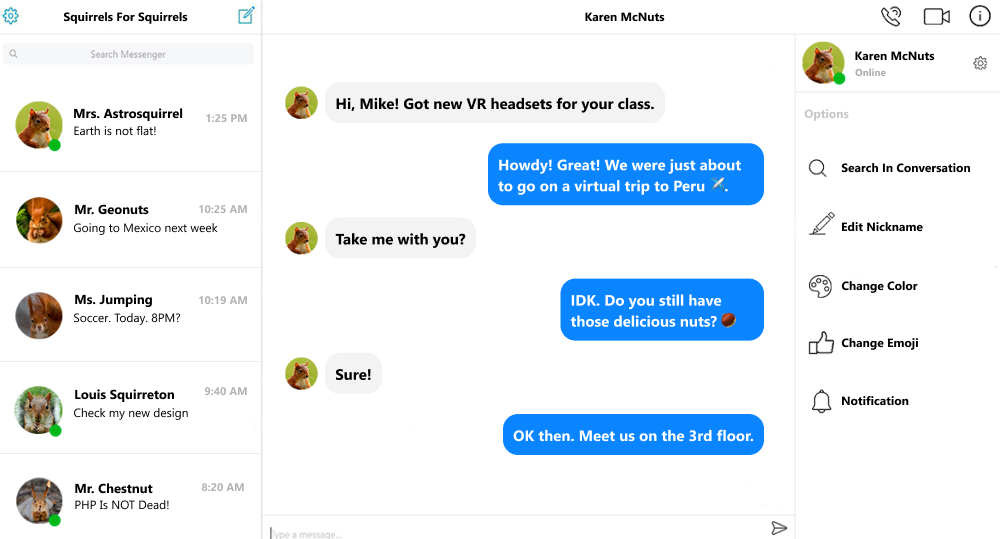You've set a goal to create your own startup. You have several ideas about what field to go into, but you’re still undecided, as they all hold great potential. Something IT-related? An online sneaker store for horses? Or a crime podcast? Hey, what do you think of EdTech startups? They're booming right now, courtesy of all of us who are used to learning, working, and celebrating birthdays remotely.
If this idea sounds appealing to you, then you've come to the right place. In today’s article, we'll explore the EdTech startup landscape, some business ideas in this space, and the steps to launching a successful startup in 2022. Let's get started!
written by:
Alexander Arabey
Director of Business Development
Contents
Intro: How Are You Doing, EdTech?
We live in the 21st century, when technology is constantly evolving. We've seen the introduction and rapid growth of artificial intelligence, virtual reality, blockchain, and many other innovations. All of them have had a significant impact on various industries, and educational institutions are no exception.
The education sector has been slower to adopt new technologies than other industries, but the situation is changing. EdTech companies are popping up all over the world, coming up with revolutionary ways to improve the way we study.
Let's find out what EdTech has in store for us today.
Current State of the EdTech Industry
How big is EdTech? How many startups in this industry are there in the US? Which countries are leaders in the field? Here are the key EdTech statistics you need to know.
Top EdTech Startups in the US
Best EdTech Startups in NYC
Name
Sphere
Founded
Number of Employees
BrainPOP
Digital platform for gamified learning
1999
51–200
Teachers Pay Teachers
Social network for educators
2006
51–200
Newsela
Platform for educational content
2012
201–500
Voxy
Live e-learning platform
2010
51–200
Knewton
Adaptive learning platform
2008
51–200
Leading EdTech Startups in San Francisco
Name
Sphere
Founded
Number of Employees
Outschool
Online classes for children
2015
51–200
MasterClass
Online courses taught by celebrities
2015
201–500
Seesaw
Student engagement platform
2014
201–500
Cambly
Online tutoring service
2013
51–200
CreativeLive
Virtual video classes for artistic students
2009
51–200
Other Notable EdTech Companies in the USA
Name
Location
Sphere
Founded
Number of Employees
Coursera
Mountain View, CA
Online platform with certified courses and degrees
2012
1001–5000
Great Minds
Washington, DC
E-learning platform
2007
501–1000
Tutor Me
Los Angeles, CA
Virtual tutoring service
2015
51–200
Udacity
Mountain View, CA
Online training courses for jobseekers
2011
201–500
Guild Education
Denver, CO
Online courses for working people
2015
1001–5000
Industry Trends and Challenges
When it comes to starting your own EdTech company, there are always trends and challenges to keep an eye on. But in the rapidly changing landscape of the education industry, it can be tough to stay ahead of the curve. To get started on the right track, take a look at a rundown of all the current highlights of this field.
What's Trending
1) Immersive Learning
Extended reality (XR) is one of the most significant trends in modern education, which greatly expands its potential. XR is an umbrella term for the following technologies: AR (augmented reality), VR (virtual reality), and MR (mixed reality). They merge the virtual and physical worlds, providing students and teachers with life experiences and practical skills they can't get in a traditional classroom setting.
The scope of XR is almost limitless: from virtual experiments in the lab and visits to the world's landmarks, to simulations of complex medical surgeries and helicopter piloting. This immersive learning also improves access to education for people with disabilities. Using XR, children with autism can practice scenarios they might encounter in the real world.
2) Hybrid Environment
Beginning as early as the pandemic, the hybrid learning trend has evolved into a long-term movement that has set the stage for other technological tendencies in education. What's it all about?
Hybrid learning is a mix of online and in-person classes. Its benefits include increased flexibility, improved access to resources, and the ability to tailor the learning experience to each student's needs. Hybrid learning is also a great way to incorporate technology into the classroom to enhance the quality of teaching, not just replace traditional methods.
3) E-learning
Just like the previous trend, e-learning is here to stay. Experts confirm this: the industry is expected to exceed $1 trillion by 2028.
Many factors are contributing to this success. First, e-learning is extremely scalable. It allows educators to reach crowds of students at once. Through Zoom, for example. It also benefits the learners: they can study at any time, from anywhere, and at a much lower cost than traditional face-to-face classes.
This freedom has enabled providers to start serving entire segments of the industry. Many colleges and universities now offer online courses that let people get bachelor's degrees. Purchasing courses on Coursera, in particular, allows you to get degrees from big-name universities like Stanford and Yale.
4) Edutainment
Gamification is nothing new to the education field. For generations, teachers have given students all sorts of rewards for doing their homework well, reading a book, or actively participating in the discussion. But the recent term — edutainment — has brought some innovative ideas to the learning process. It offers many interactive opportunities that keep students engaged — educational online games, courses, training programs where learners can earn rewards and certificates.
One prime example is the game Minecraft. Don't be surprised, it can be used to make students learn and play simultaneously. Its special Education Edition introduces a fun online platform for exploration and creativity. On the official website, you can demo a lesson and take part in a research mission to study the impact of agriculture on climate change. Moreover, teachers can use the service to create their own lesson scenarios.
5) Intelligent Technologies
Have you ever heard of AI EdTech startups? If not, you're sure to hear about a few of them soon.
The education sector has always been open to new technologies that can help connect students and improve teaching and learning processes. Recently, we've seen a surge in the adoption of artificial intelligence (AI), machine learning (ML), big data, blockchain, and cloud computing.
Each of these cutting-edge technologies has the potential to enhance the quality of education and make learning more accessible and customer-driven. Here's how:
- AI — to personalize the learning experience;
- ML — to identify student strengths and weaknesses;
- Big data — to collect data and analyze student performance;
- Blockchain — to create a secure and decentralized way to store and manage educational data;
- Cloud computing — to deliver EdTech applications and services more efficiently.
What's Challenging
1) Conservatism
Many educators are still stubbornly resistant to the latest technological advances. Some teachers are tempted to limit screen time due to concerns about the overuse of technology in the past few years. But this is a grave mistake that leaves many EdTech professionals struggling to prove the benefits and value of their software.
2) Highly Competitive Market
With the rapid growth of the EdTech industry, it's no surprise that the market is highly competitive. However, this is not necessarily a bad thing. Competition can drive companies to be innovative and create better products. It can also lower prices, making EdTech products more affordable for consumers.
3) Limited Budget
Numerous schools are funded by the state budget. While they understand the value of EdTech software, they often can't afford it, let alone the latest innovations. Therefore, the owner of an online platform should thoroughly plan a pricing strategy and consider alternative monetization options.
4) Privacy Concerns
Today, anyone can be exposed to a cyberattack. Educational institutions are also at risk. The growing number and sophistication of such attacks have serious consequences for the entire educational sector. Everything is under threat: teaching and learning processes, student and employee personal data, budgets, software, and much more we may not even know about. For this reason, many schools are hesitant to implement digital solutions that could jeopardize students' personal data. To bolster their confidence, the owners of startup EdTech companies should demonstrate that their solution is secure and reliable.
5) Ever-Evolving Technology
Another pressing EdTech challenge is that educators should not only adopt new technologies, but also find ways to integrate them into the curriculum and ensure their effective use. This can be a daunting task as progress keeps moving forward and developers are constantly introducing novel technology solutions. The primary goal of the software provider is to make the implementation process as comfortable and stress-free as possible for teachers and students alike.
5 Inspiring Ideas for EdTech Startups
If you're eager to develop the education sector and start your own business in this area, here are a few promising EdTech startup ideas.
1) Education Platform for Special Children
Excited about helping children with special needs learn about the world? This is a great option for creating an EdTech startup.
One in six (17%) children aged 3 to 17 in the US has one or more developmental disabilities. And while some great resources already exist for these kids, there's still plenty of room for improvement. By building an online learning platform, you can help special children study, grow, and thrive.
What can it be about?
- A virtual space for kids with special needs to connect with each other and get resources to help them interact in real life;
- A place for parents and caretakers to find information and support;
- A service for educators where they can share best practices and new ideas.
Good examples:
2) Corporate Training Platform
Corporate training remains a huge untapped market. There is a massive demand for a platform that can provide coaching services on topics, ranging from customer support to language learning. And there are very few companies that are currently meeting this demand.
Such software can provide businesses with the ability to train their employees online. It's a great solution for those companies that don't have time or resources for traditional one-on-one tutoring. It is also a great option for workers to learn at a convenient pace and time.
What can it be about?
- A platform with ready-made courses, where each employee can choose an area for development;
- A service where all company workers share their skills, knowledge, and experience in the form of a blog, webinars, or live communication;
- A virtual place where people can find a mentor with whom they can conduct online classes at pre-arranged times.
Good examples:
3) Social Network for Educators
Social media is one of the most influential tools in the world today. What happens when you combine it with the power of EdTech?
You get a social network for educators! This is a great idea for an EdTech startup because it will allow teachers to connect with each other, share resources, and collaborate on projects. Using such a network, they'll be able to stay up-to-date on the latest trends and developments in education.
What can it be about?
- Social network for K-12 teachers;
- Platform for higher education professors;
- Video sharing platform for educators.
Good examples:
4) Gamified Language Learning Software
There are tremendous opportunities in the EdTech market for creating a language learning educational platform that is fun and engaging for users. We believe that a great way to spin up this idea is to gamify the process of studying.
With adaptive learning technology, users will be able to level up as they learn more words and phrases and earn rewards for their progress. Not only will this make the learning process more enjoyable, but it will also motivate users to return to the platform to get more achievements.
What can it be about?
- A gamified chatbot that simulates real-life conversations;
- A cloud-based learning platform with Quizlet-style flashcards, where users can store and revise all the new words and phrases they learn;
- An online community where users can play mini-games and compete in language skills.
Good examples:
5) AR-Powered Live Online Classes
If you're looking for an EdTech startup idea with high potential, here's one to consider: online teaching with AR. This concept combines the best of both worlds: the convenience of online learning and in-person interaction in a traditional classroom.
While ordinary live classes can be somewhat dull and lack engagement, the AR-powered alternative brings the material to life. It connects students with their teachers and classmates in real-time as they view AR-enhanced content, which makes learning more interactive.
What can it be about?
- Astronomy lessons in a virtual planetarium with a telescope;
- History classes, where students explore virtual replicas of ancient civilizations and see how they lived and functioned;
- Art lessons, where students can see the instructor's work in real time and get live feedback.
Good examples:
How to Start an EdTech Startup
Like any other startup, it takes a lot of work to get an EdTech business off the ground. But if you're up for the challenge, we have some tips to help you get started. Let's take a closer look at how to build an EdTech startup.
Step #1: Exploring the Market
Before entering the EdTech market, it's crucial to do your research and study its niches and major players. This will help you understand the landscape and find a niche for your startup.
Expert tips:
- Attend industry events;
- Read trade publications;
- Talk to professionals in the field (top EdTech companies).
Step #2: Validating Your Idea
You have an innovative startup idea. But how can you make sure it's worth pursuing? Given the level of competition in the field, it's more essential than ever to validate your idea before you begin the long journey of creating an education technology company.
Expert tips:
- Narrow down your idea to the specific problem you're solving for your target market;
- Conduct customer interviews to find out the major pain points of your audience;
- Research EdTech startup competition and see what gaps they're not addressing.
Step #3: Working on Business Strategy
When starting a company, you should focus not on whom to involve in your EdTech startup funding, but on what you need to do to make your venture profitable. So along with developing a business strategy, you should define your EdTech startup business model, as well as your unique value proposition. Another crucial thing to consider is how to monetize your venture. You should have several ways in store so that you can respond effectively to changes in the market if anything happens.
Expert tips:
- Stay on top of the latest trends in the industry. This will give you an idea of where it's heading and what might become popular in the future. What's more, it will be a good starting point in creating your EdTech startup marketing strategy.
- Don't be afraid to experiment with new ideas. EdTech is all about innovations, so the more you experiment, the better.
- Always be prepared to pivot. The industry landscape is constantly changing, so you need to be flexible and ready to evolve with it.
Step #4: Gathering a Dream Team
Another challenge you'll face when building a startup is gathering the right people to work on your project. A strong team will help you create a better product and become one of the future leaders in the field. It's crucial to take the time to put together a group of experts who complement each other's skills and are passionate about your company's mission.
Expert tips:
- Surround yourself with people who have the same vision and passion for education as you do. These are the ones who will help you turn your startup into a success.
- Don't be afraid to mix things up a bit — it's always good to have a diverse team.
- Outsourcing can be a great way to get your future product done in less time and money. So, why look for costly specialists in San Francisco or New York when you can delegate all development tasks to a dedicated team of IT specialists in Europe?
Step #5: Introducing the MVP
Which is better: to constantly improve software and try out new business ideas, or create a perfect product that no one wants to buy because it's useless? To avoid this pitfall, you can create a minimum viable product (MVP). An MVP is a version of your software that has just the core features and nothing else. It's not perfect, but it's good enough to get started. Its launch is necessary to gather user feedback and study the demand. Such a step will prevent many mistakes that entrepreneurs make when building startups.
Expert tips:
- Don't get too bogged down in the details of your MVP — keep it simple and focused on basic user needs.
- Try creating your own EdTech Startup pitch deck to clearly illustrate the benefits and novelties of your MVP to potential investors.
- Don't stop at the initial version. Apply the "BML" principle — build, measure, learn. And repeat it all over again.
Reap the Benefits That EdTech Startup Grants
If, after reading our article and long hours of research, you've finally made the decision to start an EdTech startup, congratulations! You're about to embark on an exciting journey that has the potential to change the landscape of education.
Launching an EdTech startup is no easy feat, but the rewards can be fascinating. With the right team, an innovative idea, venture funding, and a bit of luck, you can create a successful business that will make a difference in the lives of students and educators around the world. What are you waiting for? Start your EdTech startup today and see where it takes you!
Don't want to jump in until you find the right experts? Contact us today, and our IT professionals will help your EdTech startup turn into a unicorn.

Contacts
Feel free to get in touch with us! Use this contact form for an ASAP response.
Call us at +44 151 528 8015
E-mail us at request@qulix.com











